Looking Back at the Future of Politics With Professor Richard Semiatin

When it comes to restoring enthusiasm for American history, David Bruce Smith’s Grateful American™ Foundation likes to shine a spotlight on the people and organizations that are the best teachers of the topic.
So it’s a great pleasure to interview Professor Richard Semiatin (pictured right), academic director of American politics at American University, who is part of its Washington Semester Program.
In addition to having spent decades studying politicians and elections, he is the author of “Campaigns in the 21st Century” (McGraw-Hill, 2004), and editor of all three editions of “Campaigns on the Cutting Edge” (CQ Press: 2008, 2012, and 2016). The third edition, available here, was released just weeks ago.
In the book, Semiatin explains that the evolution of the modern political campaign has taken us from television sets in the living room to wireless new media in the hands of voters.
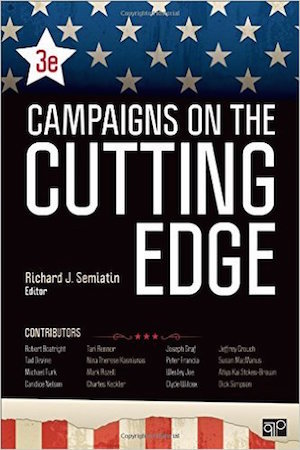 “Reaching voters with targeted messages, candidates increasingly rely on consumer-driven techniques,” he writes. “What works at the national level can be tailored to work even more effectively at the individual level. Future campaigns will continue to make use of recent innovations like meetups, blogs, and Internet polling.
“Reaching voters with targeted messages, candidates increasingly rely on consumer-driven techniques,” he writes. “What works at the national level can be tailored to work even more effectively at the individual level. Future campaigns will continue to make use of recent innovations like meetups, blogs, and Internet polling.
“Newer tactics such as fundraising on the web and get-out-the-vote drives with microtargeting via mobile devices are changing the way candidates advertise, ask for money, interact with the media, coordinate with their party organizations, and make the most of interest group support.”
What, then, are the implications for the democratic process and governance? And who does Semiatin think will be our next president?
Scroll down to learn about that, and more. — David Bruce Smith, founder, and Hope Katz Gibbs, executive producer, Grateful American™ Foundation
 Hope Katz Gibbs: Clearly, you are an expert in American politics — and in fact were interviewed countless times during the 2000 election. Tell us about that experience.
Hope Katz Gibbs: Clearly, you are an expert in American politics — and in fact were interviewed countless times during the 2000 election. Tell us about that experience.
Richard Semiatin: It was frenetic and chaotic. One network actually wanted me to go live nationally and talk about how students were almost coming to blows in the dorms about the controversial Florida recount between Bush and Gore. This came up in conversation about five minutes before we went on-air. I told them that they were being exploitative and that I refused to talk about that. I threatened dead air space if they brought it up. The question never came up.
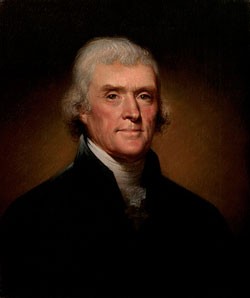 Hope Katz Gibbs: Rick, take us back a few centuries to the Founding Fathers. You created a list of five things that transcend the American Revolution and are still relevant today, including:
Hope Katz Gibbs: Rick, take us back a few centuries to the Founding Fathers. You created a list of five things that transcend the American Revolution and are still relevant today, including:
- Reason
- Abort, retry, fail
- Opportunity
- Outs are in
- All the world’s a stage except in the United States, where it is many stages
David Bruce Smith: Let’s talk about the first item on your list — reason. The United States was the first system ever designed to allow reason to prevail, via a set of written rules. But, of course, nothing is perfect.
Richard Semiatin: While nothing is perfect, that system has worked pretty well. We are “a nation of laws, not of men,” wrote John Adams. This was a direct attack on the monarchical or dictatorial governments. While outsized presidents such as Richard Nixon and Lyndon Johnson stretched the boundaries of the system, the fabric did not break — even when they may have broken laws.
 David Bruce Smith: Next, you talk about “abort, retry, fail,” which is the system of lawmaking set up in the US Constitution.
David Bruce Smith: Next, you talk about “abort, retry, fail,” which is the system of lawmaking set up in the US Constitution.
Richard Semiatin: That’s right. The Constitution is our rule book, and it deliberately makes it difficult to pass laws. In a parliamentary system, you have a lower house (usually with more power), which is ruled by a majority that writes a bill that becomes a law by a vote of 50 percent +1.
Here, the game is much more complicated. The House can pass legislation, and it can fail in the Senate; or visa versa. Or the House and Senate can pass identical legislation and the president can veto it; or she/he can sign it into law. The purpose was to ensure that the national government wouldn’t become too powerful and that the states would still be autonomous and powerful. Even in our modern world of jets, iPhones, and self-driven cars, less than 10 percent of all bills become public law.
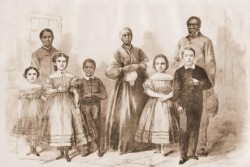 David Bruce Smith: What do you mean when you talk about opportunity?
David Bruce Smith: What do you mean when you talk about opportunity?
Richard Semiatin: Opportunity is the thrust behind our system that enables citizens to have freedom to make choices. It does not guarantee results; it guarantees the right to make choices. There was one tremendous flaw when this concept was created — choice was not given to African-Americans. In fact, they were subjugated, which was a great contradiction. Yet, it was this concept of freedom that eventually overrode subjugation and began to provide a path to opportunity for African-Americans, women, and others.
David Bruce Smith: Your fourth point is that the “outs are in.”
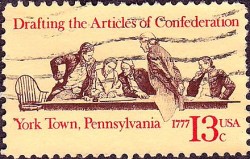 Richard Semiatin: The United States was the first nation in world history that protected minority beliefs and opinions. The nation was settled by a hodgepodge of religious cults, other groups, and individuals seeking fortune — some of whom were quite oddball.
Richard Semiatin: The United States was the first nation in world history that protected minority beliefs and opinions. The nation was settled by a hodgepodge of religious cults, other groups, and individuals seeking fortune — some of whom were quite oddball.
Today, the same oddball groups can be protected. Example: the Westboro Baptist Church, which protested funerals for Iraq veterans, claiming it was the immorality of the United States that brought the wrath of God against our nation and soldiers. This view is repulsive to 99.9 percent of the population, but speech is protected even for the tiniest and most repugnant groups.
 David Bruce Smith: Last, but not least, explain your fifth point — that “all the world’s a stage except in the United States, where it is many stages.”
David Bruce Smith: Last, but not least, explain your fifth point — that “all the world’s a stage except in the United States, where it is many stages.”
Richard Semiatin: Today we often talk in the high-tech or business world about having a platform on which to build a product and sell it. Unitary governments are the same; all the power rests in one body and in some localities — total equals two. The fact is that in the United States we have multiple stages or platforms for governing. We have local governments, as do other nations. But we were the first nation to have state governments.
Build upon that a federal government with three branches of government — executive, legislative, and judicial — and even there power is divided in the legislative branch between the House and Senate! The total stages for governing equals six! No nation in the world has anything remotely this complicated … yet it works.
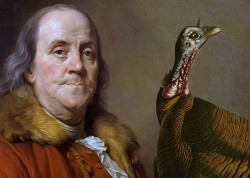 Hope Katz Gibbs: Indeed it does! Looking back at the first 100 years and today, what do you think is the biggest lesson learned? And do you think the Founding Fathers would be proud of what we’ve done with their big ideas?
Hope Katz Gibbs: Indeed it does! Looking back at the first 100 years and today, what do you think is the biggest lesson learned? And do you think the Founding Fathers would be proud of what we’ve done with their big ideas?
Richard Semiatin: The biggest lesson learned is that government by the people and for the people, as Lincoln said, always remains a work in progress. An imperfect work, you know? But in the end, it beats all the other systems because it has produced the greatest power in world history; and that power has good, not bad, intentions. That has never happened before.
I think the Founding Fathers would be proudest of the fact that the separation of powers among all three branches of government — legislative, executive, and judicial — still exists. Without it, one branch could assert all the power and render the others useless. We would have lost our democratic freedoms. The Bill of Rights would be meaningless if one branch remained unchecked.
 Hope Katz Gibbs: What’s on the forefront for you? You have a new book that just came out, “Campaigns on the Cutting Edge.” It’s the third edition, and you continue to teach at American University. What else is in store?
Hope Katz Gibbs: What’s on the forefront for you? You have a new book that just came out, “Campaigns on the Cutting Edge.” It’s the third edition, and you continue to teach at American University. What else is in store?
Richard Semiatin: I’m excited about the book. We have some great authors including Tad Devine, Bernie Sanders’ chief strategist, and Michael Turk, who ran the digital/Internet operation for the Bush re-election campaign in 2004. In terms of what’s next for me, I’m taking a break and so that my cupboard of ideas can become full again.




